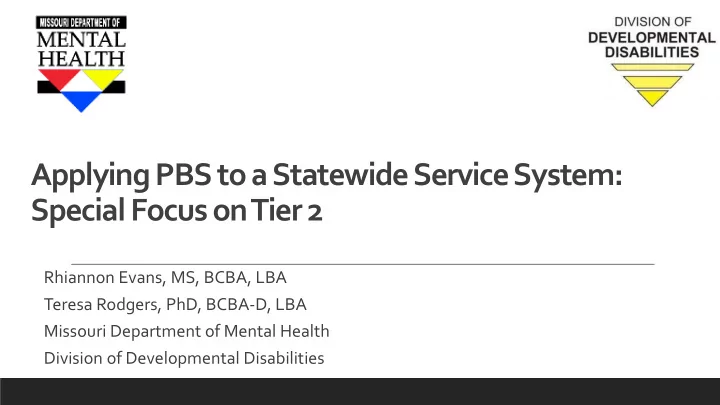

Applying PBS to a Statewide Service System: Special Focus on Tier 2 Rhiannon Evans, MS, BCBA, LBA Teresa Rodgers, PhD, BCBA-D, LBA Missouri Department of Mental Health Division of Developmental Disabilities
What we know 4 out of 10 people are at risk of or are experiencing behavioral crisis 85% of residential providers need support to predict, prevent, and reduce behavioral crisis We spend a lot of resources reacting to crisis!
Common Approaches Increased medications Added Staffing Law Enforcement Hospitalizations Provider forced moves
What we know Implementation science: we must work toward sustainability Behavioral science: achievable goals are made up of small steps Wide-spread problems: we must address at a systems level
Missouri Tiered Supports: Our Systems Approach
What is MO Tiered Supports? A state sponsored consultation process Focused on helping organizations develop systems to support positive practices for improved services
Essential Elements Common values Systems of reinforcement Active leadership Competency training Action planning Frequent feedback Team problem- Ongoing assessment solving & monitoring Professional peer Evidence-based mentorship decision making
What do we do? Define Evaluate Analyze Coach
How’s it add up? What What A Good We Do You Do Life
Tier 1 Universal Strategies Assessment (ASSET) Action-plan Data analysis Regular review and onsite coaching Training
Tools of Choice PBS competency based course Helps people build relationships Helps families stay together Free to Tiered Agencies & Family members
What’s the data say?
Change in implementation of universal strategies based on level of involvement in MO Tiered Supports 80 Baseline Post Tiered Supports 75 70 60 ASSET SCORE 60 50 52 50 45 40 36 30 20 10 0 Low Moderate High LEVEL OF INVOLVEMENT
Cost to Review Severe Behavioral Incidents by Implementation Level FY17-FY19 FY17 FY18 FY19 Level of Implementation high implementers moderate implementers low implementers non tiered $- $50,000 $100,000 $150,000 Cost of Review
Why do we need Tier 2 & 3? 40% of people need support beyond Tier 1 85% of providers need additional support
Tier 2 Prevention Strategies Data analytics Assessment (T-SSET) Problem-solving Targeted interventions Training Action-plan Review and coaching
Tier 2 Prevention Strategies Problem: Large groups of people with 1:1 and 2:1 staffing Targeted Intervention: Enhanced staffing review process
Tier 2 Prevention Strategies Problem: Providers with over 70% of population needing Tier 2 & 3 level support Targeted Interventions: Provider Support Committee Enhanced Tier 1 Frequent check ins with Statewide Tiered Supports Team
Tier 2 Prevention Strategies Problem: Behavior Support Plans are missing essential elements Targeted Intervention: Behavior Analysis Mentorship Program
Tier 2 Prevention Strategies Problem: Unplanned reactive strategies commonly used Targeted Intervention: Safety crisis plan training
What’s the data say?
Population by Tier Across Quarters 70% 63% 59% 60% % of population 50% 40% 33% 29% 30% 20% 9% 8% 10% 0% FY20Q1 FY20Q2 Quarter
The number of residential providers needing Tier 2 support 280 268 270 257 260 255 Begin Tier 2 Planning & Pilot # OF PROVIDERS 250 Implementation 240 230 224 220 210 200 FY19Q3 FY19Q4 FY20Q1 FY20Q2 FISCAL QUARTER
Severe Incidents at Agency Implementing Targeted Interventions 4 Internal 4 Coaching 3 Began in 3 # OF SEVERE INCIDENTS December 2 2 1 0 0 0 October November December January February
Tier 3 Intensive Strategies Data analytics– Identifying high risk individuals Problem-solving system– (BSRC) Action-plan Intensive interventions Review and coaching Training
Behavior Support Review Committee Committee of volunteer LBAs Meet twice monthly Whole team encouraged to attend Review BSPs Provide consultation
What do providers say? 90% of people participating in MO Tiered Supports say there has been a positive shift in their organization
Next Steps Echo to improve skills of broader audience Value based purchasing Tools of Choice hybrid course Build Tier 2 team Real-time data
Q&A TERESA RODGERS, PHD, BCBA-D, LBA RHI EVANS, MS, BCBA, LBA Chief Behavior Analyst Statewide Targeted Prevention Coordinator Teresa.Rodgers@dmh.mo.gov Rhiannon.Evans2@dmh.mo.gov
Recommend
More recommend